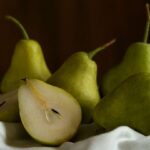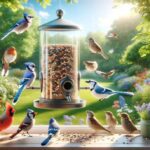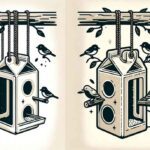Feeding birds from a suction cup feeder can be a delightful way to bring nature closer to your home, observe different bird species, and contribute to their well-being. Suction cup feeders are attached directly to windows through suction cups, offering an unobstructed view of visiting birds.
Here’s a detailed guide on what to feed birds from this type of feeder. It includes some product recommendations to help get you started.
Also Read: Homemade Nectar and Fruit Feeders for Hummingbirds: Bird Feeders
Best Foods to Offer in Suction Cup Feeders
1. Sunflower Seeds: Black oil sunflower seeds are a favorite among many bird species. They are high in fat, providing essential energy, and their small size makes them perfect for a suction cup feeder. Hulled sunflower seeds can minimize mess by reducing shell debris.
2. Suet Pellets: Suet pellets, especially those mixed with seeds, nuts, or fruit, are highly nutritious and attract a variety of birds, including woodpeckers, nuthatches, and titmice. They’re great for colder months when birds need extra calories to maintain their body heat.
3. Mealworms: Dried mealworms are a protein-rich food source that attracts insect-eating birds, such as bluebirds and wrens. They’re clean, easy to handle, and can be mixed with seeds to attract a wider range of species.
4. Nyjer (Thistle) Seeds: Nyjer seeds are tiny, oil-rich seeds that are particularly loved by finches and siskins. These seeds require a feeder with smaller holes to prevent spillage.
5. Mixed Seed Blends: A high-quality, no-waste blend that includes sunflower seeds, hulled peanuts, and white proso millet can attract a variety of birds. Avoid cheap mixes, which may contain filler seeds that most birds will not eat.
Feeding birds from a suction cup feeder not only brings the joy of birdwatching closer to your home but also provides support to local bird populations.
By offering a variety of foods such as sunflower seeds, Nyjer seeds, and quality mixed seed blends, you can attract a diverse array of birds right to your window.
Recommended Products to Help you Feed your Feathered Friends
Wagner’s 76027 Black Oil Sunflower Seed: A popular choice for bird enthusiasts, this sunflower seed attracts a wide variety of birds and fits perfectly in suction cup feeders.
Kaytee Mealworms: These dried mealworms offer a high-protein snack for your feathered friends and are an excellent way to attract insect-loving birds.
Lyric 2647440 Fine Tunes No Waste Bird Seed Mix: It consists of finely cut seeds and nuts, ideal for smaller feeders and minimizing mess.
Wagner’s 62050 Nyjer Seed Bird Food: This high-quality Nyjer seed is another excellent option to attract finches and other small-beaked birds.
Tips for Using Suction Cup Feeders
1. Location: Attach your suction cup feeder to a clean window in a quiet area. Ensure it’s in a high location, enough to prevent predators from reaching it, but still within your view for easy bird watching.
2. Maintenance: Regularly clean your feeder to prevent the spread of diseases among bird populations. A solution of one part bleach to nine parts water is effective for disinfecting feeders.
3. Refill Regularly: Keep the feeder well-stocked, especially during extreme weather conditions when birds are more reliant on supplemental food sources.
4. Monitor Bird Activity: Observing which types of birds visit your feeder can help you tailor the food you offer to attract more of your favorite species.
Also Read: How to Create a Simple Yet Effective Bird Feeder Using Everyday Materials: DIY
Conclusion: Best Foods for Suction Cup Feeders
Engaging with nature through bird feeding can be a rewarding experience, fostering a deeper appreciation for the wildlife that shares our spaces. It’s a hobby that requires minimal investment but offers rich rewards in the form of colorful visits and lively bird songs. When choosing what to feed birds from a suction cup feeder, it’s crucial to consider the dietary needs of the birds in your area and select high-quality food that will attract them.



